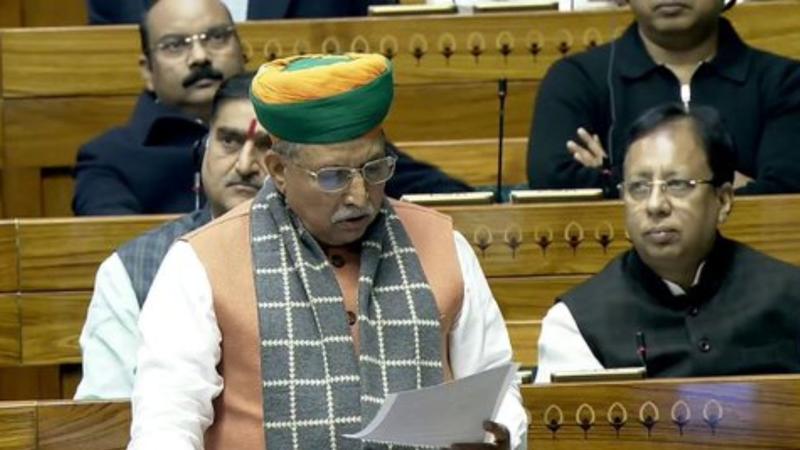Published 14:31 IST, December 17th 2024
One Nation, One Election Inches Closer to Reality: What Next?
The One Nation One Election Bill has been tabled in the Lok Sabha and ONOP is inching closer to reality. Here's what can be expected now...

New Delhi: Union Law and Justice Minister Arjun Ram Meghwal tabled the One Nation One Election Bill in the Lok Sabha today during the ongoing Winter Session of the Parliament. The ONOP Bill was tabled amid a lot of ruckus and voting was conducted for a Joint Parliamentary Committee (JPC) review. Read to know what it means and what's next…
ONOP Bill Introduced in Lok Sabha After Division of Votes
Arjun Ram Meghwal tabled the One Nation One Poll Bill in the Lok Sabha to mixed reactions by the MPs of the Lower House. The bills were introduced after the opposition sought a division of votes.
After electronic voting and a subsequent count by paper slips, the bills were introduced with 269 members in favour and 198 against. This was the first time that the electronic voting system was used in the Lok Sabha in the new Parliament House.
One Nation One Election Inches Closer to Reality, What's Next?
In this process, a joint panel will be formed on a pro-rata basis, depending on the strength of the MPs from political parties. However, BJP being the largest party is expected to to hold the chairmanship and multiple member positions. Lok Sabha Speaker Om Birla is likely to announce the committee's composition by Tuesday evening.
‘PM Modi Said It Should Be Sent to JPC for Detailed Discussion’
Speaking in the Lok Sabha, Amit Shah said, “When the One Nation, One Election Bill was taken up in the cabinet for approval, PM Modi had said that it should be sent to the JPC for detailed discussion. If the Law Minister is willing to send the bill to JPC, the discussion on its introduction can end.”
Prime Minister Narendra Modi and the NDA government have strongly advocated for the 'One Nation, One Election' proposal, describing it as a way to "strengthen democracy" by reducing the frequency of elections. They argue that simultaneous elections will save time, resources, and effort, allowing governments to focus more on governance rather than being in constant election mode .Prime Minister Modi has highlighted how the country learned from the Emergency period (1975-77), which saw the tenure of the Fifth Lok Sabha extended under Article 352. "That period showed the importance of the separation of powers. The Constitution strengthened checks and balances among the Legislature, Executive, and Judiciary, helping democracy evolve," he said.
While tabling the bill in the lower house, Arjun Ram Meghwal has said, "I will talk on legislative competency; autonomy issue was also raised. No constitutional principle is being violated with the introduction of this bill, we are not amending any article. ONOP is pending since last 41 years and it was PM Modi who took cognizance of it. He has far-sightedness and capability to bring change."
What is One Nation One Election?
'One Nation, One Election' refers to the simultaneous conduct of Lok Sabha, Assembly, and local body (urban or rural) elections in the same year, if not a same time. This practice was followed from independence time which later discontinued in 1967, covering four polls starting with the first general election in 1951-52.
The premature dissolution of certain state governments in 1968-69 and the early termination of the Lok Sabha in 1970 disrupted the cycle of simultaneous elections. Currently, only seven states hold elections concurrently with the Lok Sabha polls. Among them, Andhra Pradesh, Odisha , and Sikkim participated in simultaneous voting during the April-June Lok Sabha elections earlier this year. States like Maharashtra , Haryana , and Jharkhand conduct their polls in the latter half of a general election year.
The idea of holding simultaneous elections is not new to India. In the early years after independence, elections for the Lok Sabha and State Assemblies were held together in 1951-52, 1957, 1962, and 1967. However, this practice was disrupted when several State Assemblies were dissolved prematurely in 1968 and 1969. This led to the decoupling of assembly and parliamentary elections. Subsequently, the Fourth Lok Sabha also saw its term cut short, leading to early elections in 1971. While the First, Second, and Third Lok Sabhas completed their full five-year terms, political instability in later years often resulted in premature dissolution.
(Inputs from Agencies)
Get Current Updates on India News, Entertainment News along with Latest News and Top Headlines from India and around the world.
Updated 14:31 IST, December 17th 2024




